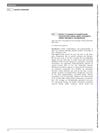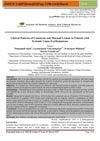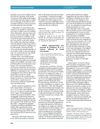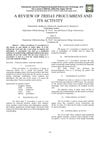 1 citations,
December 2011
1 citations,
December 2011 Marine-derived ingredients show potential for hair health but need more human trials to confirm effectiveness.
 1 citations,
September 2010 in “The journal of investigative dermatology/Journal of investigative dermatology”
1 citations,
September 2010 in “The journal of investigative dermatology/Journal of investigative dermatology” The meeting highlighted major advances in skin research, including new findings on skin microbes, genetic links to skin diseases, and improved treatments for various conditions.
 July 2023 in “Journal of allergy and clinical Immunology. Global”
July 2023 in “Journal of allergy and clinical Immunology. Global” A 10-month-old boy with a rare combination of genetic conditions has severe immune deficiency and treatment challenges.
 March 2023 in “Revista română de reumatologie”
March 2023 in “Revista română de reumatologie” Skin problems are common in lupus, often appearing first, with various types and treatments, and careful monitoring is important for diagnosis and management.
 August 2019 in “Journal of Medical Histology”
August 2019 in “Journal of Medical Histology” EMT helps heal tissues but can cause scarring and other issues if prolonged.

Lichen planopilaris and frontal fibrosing alopecia are likely the same disease with different clinical appearances.
January 2016 in “Çağdaş tıp dergisi” Topical 1% pimecrolimus effectively treated alopecia areata.
 November 2024 in “PubMed”
November 2024 in “PubMed” Terbinafine can cause skin reactions when exposed to sunlight, so sun exposure should be avoided during treatment.
 August 2024 in “Intisari Sains Medis”
August 2024 in “Intisari Sains Medis” A 17-year-old girl with lupus had vocal cord paralysis but improved with treatment.
 March 2024 in “Poster presentations”
March 2024 in “Poster presentations” A woman with lupus and Kikuchi-Fujimoto disease improved with treatment.

Cord blood platelets may have promising future medical uses but need more research.
 October 2023 in “Benha Journal of Applied Sciences”
October 2023 in “Benha Journal of Applied Sciences” Serum clusterin may play a key role in the inflammation and immune response in post-adolescent acne.
 July 2023 in “The Egyptian Journal of Hospital Medicine ”
July 2023 in “The Egyptian Journal of Hospital Medicine ” Alopecia areata is a hair loss condition caused by immune factors and can be treated with JAK inhibitors.
 February 2023 in “Research Square (Research Square)”
February 2023 in “Research Square (Research Square)” Genetic testing confirmed a rare skin disorder in a young girl, which improved with zinc supplementation.
 November 2022 in “DOAJ (DOAJ: Directory of Open Access Journals)”
November 2022 in “DOAJ (DOAJ: Directory of Open Access Journals)” COVID-19 may cause hair loss months after infection.
 October 2020 in “Authorea (Authorea)”
October 2020 in “Authorea (Authorea)” Men and women react differently to opioids, with hormones potentially influencing these differences.
 May 2020 in “International journal of biology, pharmacy and allied sciences”
May 2020 in “International journal of biology, pharmacy and allied sciences” Vitiligo is often found with other autoimmune diseases, which is important to know to help patients.
 March 2020 in “Poster presentations”
March 2020 in “Poster presentations” Accurate diagnosis of SLE requires extensive testing due to its complex symptoms.
 August 2019 in “Regenerative Medicine”
August 2019 in “Regenerative Medicine” In June 2019, the stem cell research field saw major progress, including new clinical trials, FDA approvals, and industry collaborations.
 March 2019 in “Journal of medical science and clinical research”
March 2019 in “Journal of medical science and clinical research” Skin problems are common and early signs of Systemic Lupus Erythematosus, and certain immune system markers are important for diagnosis and treatment.

Melatonin can improve treatment and extend remission for certain skin conditions.
January 2014 in “International Journal of Clinical Medicine” Premature aging increases the risk of immune problems and autoimmune diseases.
 June 2006 in “Annales de Dermatologie et de Vénéréologie”
June 2006 in “Annales de Dermatologie et de Vénéréologie” Tranexamic acid effectively reduced swelling episodes in a girl with a rare form of hereditary angioneurotic edema.
 September 2017 in “Majallah-i taḥqīqāt-i ̒ulūm-i pizishkī-i Zāhidān”
September 2017 in “Majallah-i taḥqīqāt-i ̒ulūm-i pizishkī-i Zāhidān” Androgenetic alopecia is a long-term, immune-related disorder that starts during puberty due to androgen secretion, and it might be improved with iron tablets, platelet transfusion, and anti-inflammation therapy.
 49 citations,
April 2000 in “Journal of The American Academy of Dermatology”
49 citations,
April 2000 in “Journal of The American Academy of Dermatology” Despite progress in treatment, the exact cause of Alopecia areata is still unknown.
 1 citations,
January 2017 in “Springer eBooks”
1 citations,
January 2017 in “Springer eBooks” Understanding the immune-related causes of Alopecia Areata has led to potential treatments like JAK inhibitors.
 December 2019 in “International journal of engineering applied science and technology”
December 2019 in “International journal of engineering applied science and technology” Tridax procumbens, a weed, has various medicinal properties including wound healing and antibacterial effects.
7 citations,
March 2022 in “Journal of the American Academy of Dermatology” Stress can trigger or worsen alopecia areata.
1 citations,
January 2018 in “Skin appendage disorders” The complement system might be involved in the development of alopecia areata and could lead to new treatments.
1 citations,
March 2022 in “Dermatology Research and Practice” Higher CD70 and CD27 gene expression in alopecia areata lesions predicts disease severity and activity.

























